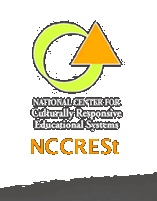
---

---

---

---

---

|
 |
 |
NCCRESt
part of the Education Reform Networks
You are in:
Subject —>
Theories
-
Education. CUNY Panel: Rethinking the Disciplines. Women in the Curriculum Series
This collection of four essays examines the ways in which education, as a discipline, currently reflects ongoing scholarship on gender, race, ethnicity, social class, and sexual orientation. In "Teacher Education and Multicultural Education: Research, Students, and Teaching" Carl A.
-
For Knowledge: Tradition, Progressivism and Progress in Education--Reconstructing the Curriculum Debate
Draws on realist theories of knowledge and epistemologies in the philosophy of science in order to argue that databases around the English school curriculum would benefit from such approaches. Reviews ways that knowledge has been conceived as social in educational thinking.
-
Implementation Strategies for Creating an Environment of Achievement
Convinced of the educational benefits of campus diversity, Mt. Holyoke College (Massachusetts) developed policies and practices to foster the academic and social skills needed for success in a diverse society.
-
Teaching the Third Culture Child
Examines experiences of a 5- and 7-year-old entering a U.S. early childhood program in context of child development theory, constructivist philosophy, and the Japanese social teaching model.
-
The Theoretical Foundations of Professional Development in Special Education: Is Sociocultural Theory Enough?
This article reviews sociocultural, multicultural, and critical pedagogical theories and suggests that an adequate and sufficient theoretical framework for professional development in special education must explicitly and directly address issues of power, discrimination, and relative status that underlie dilemmas of practice. It offers vignettes of such dilemmas, with reference to the 1998 Council for Exceptional Children's professional standards.
|
| |
 |
|





